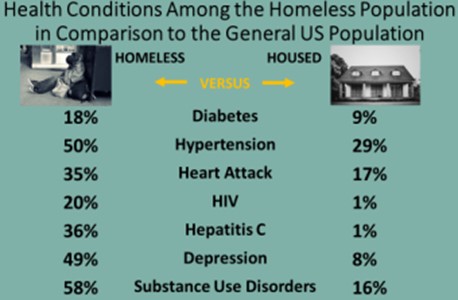In January, Aurora, Colo. Mayor Mike Coffman made headlines when he went undercover for seven days posing as a homeless veteran while he lived amongst Denver and Aurora’s unhoused communities. Coffman said his aim was to discover how he and other policymakers can help the city’s unhoused. However his main takeaway, that “drug culture” causes homelessness in American cities, is based on the flawed assumption that addiction is a “lifestyle choice” rather than a disease. Furthermore, this idea ignores the role that the health care crisis plays in exacerbating homelessness.
Medical debt is the leading cause of bankruptcies in the United States. Yet people with medical debt are not irresponsible nor mismanaging their funds. A report put out by the Consumer Financial Protection Bureau revealed that at least half of those with medical debt are reliable payers and have no other debts on their credit report. Given the US health care system, it sadly makes sense that even the most financially responsible people struggle when it comes to health expenses. While average family premiums for employer-sponsored health insurance have increased by 54% over the last decade, wages have only increased by 29%.
A recent report published by the Metro Denver Homeless Initiative shows that mental health conditions, chronic health conditions, physical disabilities, and substance abuse are common traits among people experiencing homelessness. And it’s very possible that struggling with these conditions is what drives people into homelessness in the first place. Another report from the National Law Center on Homelessness & Poverty indicates that two major causes of homelessness are struggling with a mental illness while not having access to needed services, and struggling with substance abuse while not having access to needed services. Other major causes are a lack of affordable housing, poverty, and unemployment, which also makes sense. Nearly half of Americans get their health insurance through their employer, meaning that losing your job often entails losing your health insurance as well. When Mayor Coffman chalks the whole issue up to “drug culture,” he is ignoring that substance abuse disorders often require professional help, and that the real issue of homelessness is caused by a lack of universal health care and government assistance.

Homelessness is a health issue in its own right. Across the board, the homeless population struggles with health issues much more in comparison to the general population, and this may be because people are more likely to fall into homelessness when struggling with health problems. Once experiencing homelessness, it is even more difficult to recover from health issues or get access to proper health care. Without a proper home, people are more likely to get sick with diseases like tuberculosis and pneumonia, suffer from skin infections, struggle with malnutrition, and are also subject to the dangers of severe weather. It’s estimated that the life expectancy for an unhoused person is some 20-30 years less than the life expectancy of the average American.
Living unhoused is dangerous, and a lack of universal health care only exacerbates the issue. Not only would universal health care help millions of unhoused people across the country get the care they need, but a proper health care system would eliminate homelessness altogether by addressing the fact that housing is a health issue, a need, and a right. It is time for our elected officials to stop viewing unhoused people as irresponsible, and instead determine how we can address their health needs and put a roof over everyone’s heads.
Image source: National Health Care for the Homeless Council & Health Center Patient Survey (HCPS) 2009


